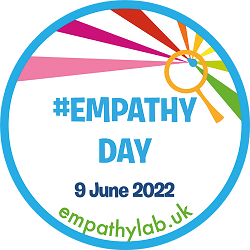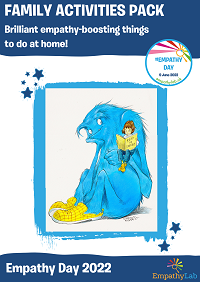This article is in the Category
Empathy in Action
Ahead of Empathy Day on 9 June, a report into the impact of one school’s work with EmpathyLab, plus ways to get involved.
 It’s Empathy Day on Thursday 9 June, a chance for everyone to support EmpathyLab’s mission to raise an empathy-educated generation through the powerful tool of reading. ‘Every child deserves the chance to be surrounded by empathy, and to develop strong empathy skills, which will play a pivotal role in their life chances, as well as being vital for successful relationships, collaboration, and learning.’ says founder Miranda McKearney. Empathy is now recognised as a force for social change, as pupils are inspired to put empathy into action.
It’s Empathy Day on Thursday 9 June, a chance for everyone to support EmpathyLab’s mission to raise an empathy-educated generation through the powerful tool of reading. ‘Every child deserves the chance to be surrounded by empathy, and to develop strong empathy skills, which will play a pivotal role in their life chances, as well as being vital for successful relationships, collaboration, and learning.’ says founder Miranda McKearney. Empathy is now recognised as a force for social change, as pupils are inspired to put empathy into action.
In January 2020 a cluster of schools in a deprived part of west Wales began work with EmpathyLab on their in-depth empathy education programme. Teacher Kate Clarke, the school’s Health and Wellbeing lead, led the work for her primary school, Pembroke Dock Community School.
The cluster was responding to the way empathy features in the new Curriculum for Wales, where it appears 35 times. The schools involved also wanted to find ways of embedding better behaviours in pupils, and to build self-esteem and a sense of responsibility to others.
As they embarked on their journey with EmpathyLab, they were immediately able to see the need for pupils to form strong empathy skills in order to build the strong relationships that are required in an ever-changing world. Kate describes it as a lightbulb moment for the group, who were able to see how books could be used both to develop empathy skills and a feeling of security in the pupils.
Kate and the team bought the recommended texts in the Read for Empathy collections – one set for each class. They began using these with classes at the end of each day. A virtual assembly was held which explained for all the children involved that empathy is different from sympathy and reinforced the fact that empathy was important in developing a positive school ethos.
Each year group based their empathy learning on a text, and teachers focused on reading for pleasure whilst reading the stories recommended by EmpathyLab. They were delighted at the discussion the texts sparked amongst year 5 and year 6 pupils about the differences and similarities between individuals.
As part of the school’s empathy work, they developed a topic titled ‘Don’t hate, educate’. A local MOD site was being used as a refugee camp,  and some members of the schools’ own community were taking part in demonstrations against the refugees. A part of Kate’s mission was to give pupils the skills to question what they were seeing around them.
and some members of the schools’ own community were taking part in demonstrations against the refugees. A part of Kate’s mission was to give pupils the skills to question what they were seeing around them.
The empathy-focused work also helped hugely during the return from the pandemic, as a high proportion of the pupils were suffering from emotional and mental health difficulties ranging from separation anxiety to loss, bereavement and trauma. Pupils were frustrated and anxious and the reading of empathy texts and the learning of empathy skills were a huge support. Relationships deepened.
The texts helped children question the racism that they were seeing in their own community, to deepen their own sense of empathy and to build pupils’ solidarity with people facing inequality daily. The learning and reflection were greatly helped by visits from Rashmi Sirdeshpande and Onjali Rauf.
Empathy Day itself was a huge celebration in Kate’s school as well as the others in the Pembroke cluster. Kwame Alexander was inspirational and opened up pupils’ eyes to the writing process. There were author videos and masses of activity and Kate describes ‘a buzz like electricity’ around the school.
The effects in the school have been long-lasting and tangible as empathy is put into action. For example, the children have created a food share in reception for members of the community in need and this initiative, led by 5 and 6 year olds, will have a lasting effect on the school’s wider community.
 In Kate’s words, ‘Our pupils in Pembroke Dock Community School have had access to texts that have helped them understand and value others’ lives and perspectives. EmpathyLab have helped us to harness this power and I believe that every school and organisation should take the opportunity to harness the true power of empathy.’
In Kate’s words, ‘Our pupils in Pembroke Dock Community School have had access to texts that have helped them understand and value others’ lives and perspectives. EmpathyLab have helped us to harness this power and I believe that every school and organisation should take the opportunity to harness the true power of empathy.’
The strategy for all of EmpathyLab’s work is built on two key areas of scientific research from neuroscientists and psychologists: 1. empathy is learnable – and 2. reading is a powerful tool to develop it.
This year’s Empathy Day theme is Empathy, Our Human Superpower, and there are a range of powerful activities available for use in schools, libraries and at home. The activities are broken into three main themes – read, connect, and act. At the heart of the campaign is a Superpower Challenge, which will help children and young people develop their empathy muscles. There are nine fun, creative empathy-boosting activities to do throughout May and June. Children can chart their progress on downloadable record cards, earning a digital badge if they complete three activities or a certificate signed by Michael Rosen if they do all nine. Find out more about the challenge.
If you’re looking to discover great books to inspire your Empathy Day activity, look no further. The Read for Empathy Collection is a diverse list of 60 expertly selected titles for children and young people aged 4-16, building empathy by giving insight into the lives of others.
Furthermore, EmpathyLab are harnessing the powerful kinetic energy of authors and illustrators, through Empathy Day Live! an online festival on Thursday 9 June, streaming a full morning of fun and engaging video content, which brings the challenge to life in the classroom and library. Authors and illustrators including Children’s Laureate Cressida Cowell, Jacqueline Wilson, Michael Morpurgo, Rob Biddulph, Elle McNicoll and Bali Rai will be modelling the Challenge activities for children.
In the run-up to the day, watch the flagship debate, the Empathy Conversation, online on Wednesday 25 May, where top psychologists and award-winning authors, Lemn Sissay, Katherine Rundell and Manjeet Mann will be sharing their views and expertise, free for all to join.
EmpathyLab also offer a range of expert CPD training for teachers and authors.
Join the movement! Sign up for a free toolkit for inspiration and ideas for early years, schools, libraries and families.



